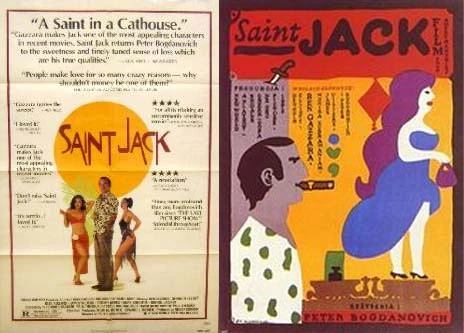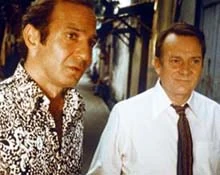Saint Jack (1979) was groundbreaking in that it was the first Hollywood movie to be filmed entirely on location in Singapore, the first to contain a gay Singaporean sub-plot complete with full frontal male nudity and the first to have a Singaporean trans woman nude scene.
The film was adapted by Peter Bogdanovich, Howard O. Sackler and Paul Theroux from the 1973 novel by Theroux himself. It tells the story of Jack Flowers, a pimp in Singapore. Feeling hopeless and undervalued, he tries to make money by setting up his own bordello and clashes with Chinese triad members in the process. Ben Gazzara stars as Flowers in the movie which was directed by Bogdanovich. Saint Jack paints a portrait of a pimp with a heart of gold, who is less an ugly colonial American abroad than an outsider trying to make the best of a bad situation. Even though it was not Bogdanovich's original intention, the film forms an invaluable cultural and geographical chronicle of Singapore in the late 1970s. However, to get approval from the Singaporean authorities to shoot the film, the crew submitted a fake storyline.
Background[]
Actress Cybill Shepherd had wanted to make the novel into a film ever since Orson Welles gave her a copy. Her wish came true after she sued Playboy magazine for publishing photos of her from "The Last Picture Show" without her permission and was awarded, as part of the settlement, the rights to the novel. She was reportedly involved with Bogdanovich, Sackler and Theroux in the print-to-screen adaptation but not credited for it[1].
After a couple of major studio flops, Peter Bogdanovich returned to his 1960s filmmaking roots with this Roger Corman-produced low-budget film.
Saint Jack was shot entirely on location in various places in Singapore in May and June of 1978. To date, it is the only Hollywood film to have been 100% shot on location in Singapore. Places featured in the film include the former Empress Place hawker centre (now demolished), Bugis Street , Paya Lebar Airport (see video:[2]), Shelford Road, College Road and Telok Kurau. The local authorities knew about the book, hence the foreign production crew did not tell them that they were adapting it, fearing that they would not be permitted to shoot the film. Instead, they created a fake synopsis for a film called "Jack Of Hearts" (what the director called "a cross between Love is a Many Splendored Thing and Pal Joey"[2]) and most of the Singaporeans involved in the production believed this was what they were making.
Releases[]
The 112 minute-long movie was rated "R" and released in 1979 in the US[3]. It became available on VHS videotape soon after.
Saint Jack was re-released in North America on DVD in 2001.
Book[]
A book which details the development, production and aftermath of the Saint Jack film, entitled "Kinda Hot: The Making of Saint Jack in Singapore", was published by Marshall Cavendish in March 2006 and is written by film critic Ben Slater.
In an interview with The New York Times on 15 March 2006, Bogdanovich said, "Saint Jack and They All Laughed were two of my best films but never received the kind of distribution they should have."
- Read a very detailed blog entitled "KINDA HOT: A book about Saint Jack" on Blogspot by the author Ben Slater, a British expatriate living in Singapore:[4].
Award[]
Cinematographer Robby Müller lent an appropriately gritty look to the matter-of-fact narrative. With restrained and forceful performances by Gazzara and Elliott, Saint Jack was something of a succès d'estime for the embattled Bogdanovich, winning the Italian Journalist Award for Best Film at the 1979 Venice Film Festival. While not a box-office success, it remains an affecting and unsung character study of a man's desire to forge a reasonably honorable life in a dishonorable profession.
Ban[]
The film was banned in Singapore and Malaysia on 17 January 1980[5]. The Singapore censorship authorities axed it "largely due to concerns that there would be excessive edits required to the scenes of nudity and some coarse language before it could be shown to a general audience."
Observers, however, speculate that it was also banned locally because it portrayed Singapore in bad light, namely showing that:
- the sex trade was flourishing,
- prostitution was semi-officially sanctioned and
- Singapore supported the losing side in the Vietnam War.
The ban was only lifted in March 2006. It is now an M18-rated film.
Storyline[]
The story was set against Singapore as a US military-approved rest and relaxation (R&R) destination for US troops in Vietnam circa the early 1970s.
The film is a compelling character study, revolving around protagonist Jack Flowers, played by actor Ben Gazzara. He is an amiable, easygoing, ambitious, savvy but not unsavoury, small-time American expatriate pimp trying to make his fortune in the Singapore of the early 1970s and intending to return to the States to lead a life of luxury. Flowers legally and illegally looks after the sexual needs of American and British businessmen and strikes up a friendship with the mild-mannered William Leigh (Denholm Elliott), a genial and decent auditor who travels to Singapore every year. With his gift for putting clients and girls at ease, Flowers is offered the opportunity by the CIA to run a brothel and supplying girls to the American GIs on leave in Singapore during the Vietnam War and barracked at Shelford Road (a fact corroborated by university students at the Bukit Timah campus) as part of their R&R activities. Flowers makes a success of the whorehouse but pressure from local Chinese gansters soon puts him out of business. Ever the survivor, he starts working for the shady, Cuban-cigar-smoking Eddie Schuman (played by Bogdanovich himself) as a pimp for GIs. But Jack's conscience starts to dog him when Schuman hires him to take compromising pictures of a visiting US Senator (George Lazenby).
Gay sub-plot[]
An interesting segment in the film depicted the conservative Senator (played by one-time James Bond actor George Lazenby), who was gay, picking up a late-teenager named Tony along Orchard Road and bringing him to his hotel room for sex. Tony was bribed by Flowers to secretly leave the door open. Through the slightly ajar door, Flowers snapped photos of the Senator together with Tony who was clad in a towel and who removed it to reveal his completely naked body[6].
The film recorded for posterity that there were rent boys plying their trade along Orchard Road during those days. This could have been related to presence of Le Bistro along Scotts Road and Pebbles Bar at the Hotel Singapura Continental. The movie was allowed to be shown just once during a Singapore Film Festival until the ban on it was lifted in March 2006. The Singaporean actor, Edward Tan, who played Tony the rent boy created a first in Singapore gay film history. However, according to Bogdanovich, all the Singaporeans who were given screen roles were not really 'actors' at all, but simply recruited from a casting call.
Transgender scenes[]
The movie contains two transgender scenes - one of the hustle and bustle of Bugis Street in the 1970s, complete with a dazzling transwoman in a platinum blonde Afro and another in a brothel in Telok Kurau where 2 post-operative male-to-female transsexuals perform a dance completely nude[7].
Entire movie[]
On 26 December 2016, the entire movie was uploaded to YouTube[8], and on 7 January 2022 to Facebook[9] :
Cast[]
- Ben Gazzara as Jack Flowers
- Denholm Elliott as William Leigh
- James Villiers as Frogget
- Joss Ackland as Yardley
- Rodney Bewes as Smale
- Mark Kingston as Yates
- Lisa Lu as Mrs. Yates
- Monika Subramaniam as Monika
- Judy Lim as Judy
- George Lazenby as Senator
- Peter Bogdanovich as Eddie Schuman
- Joseph Noël as Gopi
- Edward Tan as Tony
(See Internet Movie Database (IMDB) for complete cast:[10]).
Screenwriters[]
- Peter Bogdanovich
- Howard Sackler
- Paul Theroux
Producers[]
- Roger Corman
- George Morfogen
- Edward L. Rissien
Cinematographer[]
- Robby Muller
Editor[]
- William C. Carruth
Video response to Saint Jack[]
On 27 January 2017, a karaoke music video entitled, "No One Wants To Dance", made by Amanda Lee Koe for the Asian Film Archive as a site-specific response to Saint Jack, was uploaded to YouTube. The video was a reaction to the 1979 movie which was banned in Singapore for more than twenty years, and the forcible removal of transwomen from Bugis Street in the mid-1980s with police slogans such as "Tourism does not depend on transvestites"[11].
It queried what it meant for a Singaporean girl to hanker after a vision in some white man's New Wave Hollywood movie, in a production bankrolled by Playboy. Did the non-professional Singapore cast have agency in their roles, was there room beyond stereotypes? What does it mean to act and to voice and to show and to tell?
Shot mostly on an iPhone by Kirsten Tan, No One Wants To Dance replicated and implicated the white man's moviecam gaze by way of pseudo-authentic representation and "local color" even while it documented a voice from the underrepresented Singaporean transgender community and the irrevocable loss of Bugis Street (and the continuous obsessive-compulsive tendency to clean up still extant in Singapore).
Anita is a 60-year-old transwoman who was a Bugis Street old-timer in its heyday, and through long conversations with her before the making of the video, the producers were given to know that "Bugis Street was the most beautiful place in the world. It was the only place I felt at home. There will never, never, never be another Bugis Street."
The karaoke video was played for a month in a swanky VIP lounge opposite the site of the old Bugis Street - stomping ground of transwomen in '60s and '70s Singapore, where boisterous sailors, convivial conversation, hard drugs, chilli crab and bartered sex could all be found in one place. Once referred to as the Montmartre of Asia, Bugis Street is now a by-the-numbers pedestrian mall peddling Hello Kitty keychains / fast fashion / McDonalds.
- Lyrics: Amanda Lee Koe
- Vocals: Amanda Lee Koe, featuring Anita
- Music: Kiat & Cherry
- Archival images: Anita
- Director: Kirsten Tan
- Assistant: Si En Tan
Toh Hun Ping's comparison of historical and modern Singapore[]

Saint Jack (1979) - Historical & Modern Singapore Comparisons (by Toh Hun Ping)
See also[]
References[]
- Watch or download the complete movie on Stagevu:[12].
- Trailer on Rotten Tomatoes:[13].
- Trailers of Saint Jack on YouTube:[14],[15].
- Movie review on Epinions:[16].
- Move review by Bob Gonsalves on Angefire:[17].
- Alex Au, Yawning Bread article, "Saint Jack slays two myths", January 2007[18].
- A very detailed blog entitled "KINDA HOT: A book about Saint Jack" on Blogspot by the author Ben Slater, a British expatriate living in Singapore:[19].
- Movie listing on IMDB:[20].
- Saint Jack book description from a Paul Theroux fan website:[21].
- Mayo Martin, "S’pore Writers Fest: Paul Theroux and S’pore go way back", TODAY, 23 September 2014[22].
- Ron Yap, "The Counter-Imperialist: Reflections on Bogdanovich’s Saint Jack (1979) by a Singaporean", Bright Lights Film Journal, 2017[23].
Acknowledgements[]
This article was compiled by Roy Tan.







